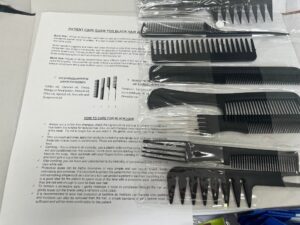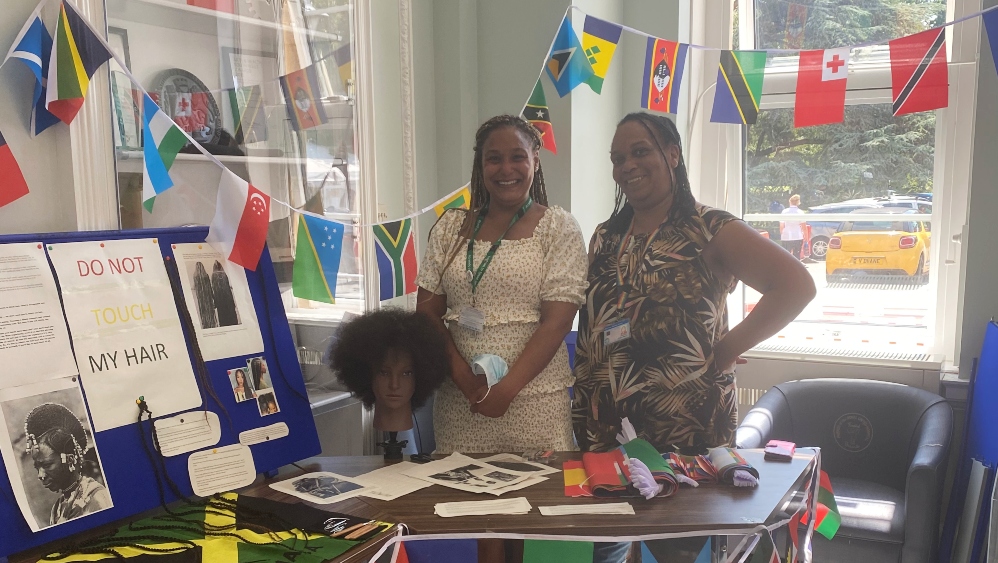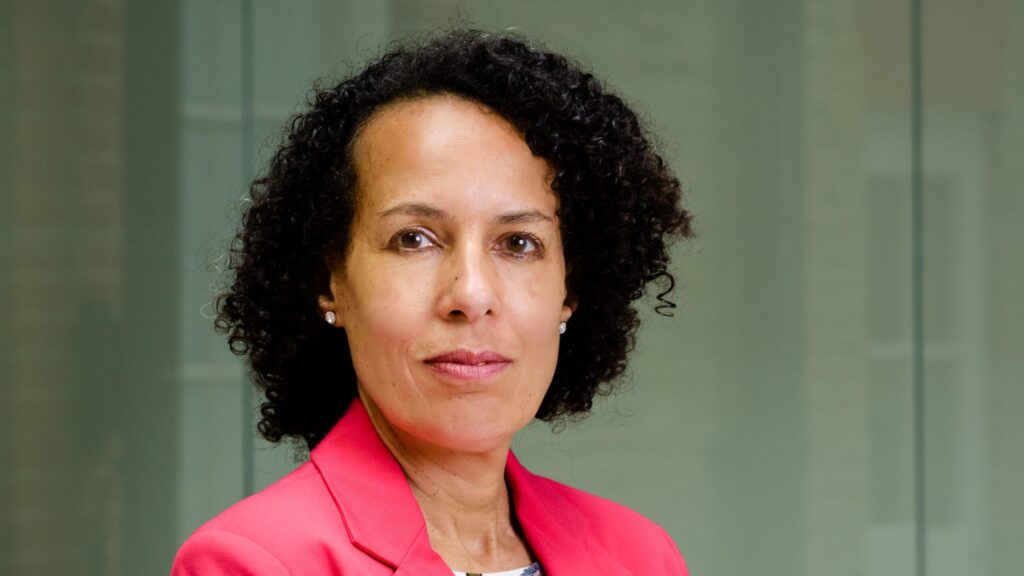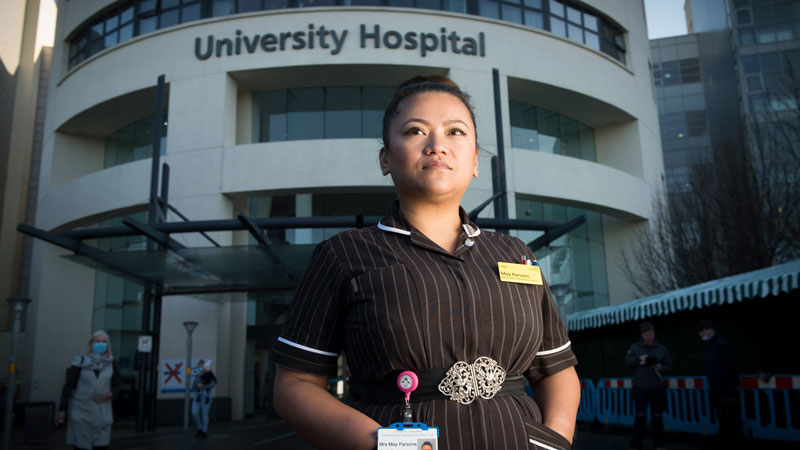Alvina Ware
UNISON member Alvina Ware (pictured above) is a clinical practice support worker at the Royal United Hospital (RUH) in Bath. Over the past two years, Alvina has transformed hair and skincare for Black patients at the hospital.
During the COVID-19 pandemic, Alvina began to notice that elderly Black patients on her ward weren’t getting the skincare and haircare they needed – and set about to change that.
“Culturally it’s so important for our hair and skin to be oiled,” she explains. “Skin is the biggest organ in the body, and usually when a Black elderly person is in hospital, their family will come and take care of them, bringing moisturiser and doing their hair.”
During lockdown, when family visits were banned, Alvina started bringing her own products from home to make sure that Black elderly people in her ward were taken care of.
“I kept seeing people who were Black, sick or dying, and when their family members weren’t able to come in due to lockdown, they didn’t have the right products for their hair and skin. I knew their families at home would be so upset if they knew their hair wasn’t right and they didn’t have what they needed for their skin.
“I remember seeing a Black gentleman in one of the bays who had really dry legs, but no moisturiser, and the shops were shut because of lockdown. I asked him what cream he usually uses at home and he said Palmers, which I had in my bag. I decanted it into a bottle for him. He was so happy.”
This was a lightbulb moment for Alvina. “As a Black woman, I know how important hair is. I began to ask: what products do we have in hospitals for Black patients? Are they suitable?”
Alvina visited the on-site charity that provides basic wash bags for patients – including things like soap, a toothbrush and shower gel – to see if she could get some supplies for her patient. When she asked whether there was anything suitable for Black skin, the answer was no.
“I said to myself: I need to get these products onto the ward.”
With the help of UNISON, Alvina produced a patient care guide for hospital staff on Black hair and skin. UNISON also helped her purchase small trial packs of moisturiser and hair products, afro combs and silk caps to hand to Black patients.

Patient care guide for black hair
“I took the packs round to all the wards, and also gave them to Black hospital workers. It was good to make them feel included, because when we get freebies, they’re often products made for white skin. We’re particular with our coconut oils and cocoa butters.”
Alvina has since become the RUH inclusion ambassador, and the hospital has committed to replenish the care packs for Black patients. Alvina now teaches a module on Black hair and skin to healthcare assistants and student nurses, with the dual aim of “demystifying Black hair for white colleagues” and making sure that Black patients get the care they need.

Alvina Ware and Sherron Watson, inclusion ambassadors at RUH Bath
“I noticed that my white colleagues were too afraid to ask people’s family members how to look after Black hair and skin, so it was left to me to do it. I recommend that white healthcare workers just ask, and be educated. Otherwise, we end up with our poor elders all dried up in their beds.”
Alvina is proud of what she’s achieved, and knows there’s still more to be done. She sees Black History Month as a “celebration”, and this year she’ll be using the opportunity to run Black hair tutorials for hospital workers.
Chris Akaluka
UNISON Newham healthcare branch secretary Chris Akaluka (pictured below) is a security supervisor for Barts Health NHS trust. Like Alvina, he also sees Black History Month as a celebration. In October, his branch is coordinating an event to celebrate Black members’ talents and skills outside of work. It’s titled ‘Much More Than You Are’.

Chris says: “We want to give people the opportunity to feel a sense of belonging, to look beyond their bands and the colours of their uniform.
“In the NHS, we have a problem I refer to as ‘bandism’, where people on higher bands look down on those on lower bands. I don’t think people are always aware they do this, but sometimes people want to know what band you’re on before they decide if what you say is relevant.”
In the NHS, where only 7.4% of workers on highest bands are Black, the ‘bandism’ Chris describes becomes a racialised problem.
“The event is an opportunity to truly create an all-inclusive environment. People participating in this exhibition cut across all bands in our branch. It’s an opportunity to tell everybody that they are truly much more than their band, and their job. We have people who will be showing film, fashion designs, food, photography and performing songs. I have an MA in film, and I’ll be showing my films.”
As winter approaches and the cost of living crisis bites, Chris believes the timing for the event is key.
“The COVID-19 pandemic had a devastating impact on Black NHS workers. A lot of my colleagues right now are still going through some sort of PTSD. The cost of living crisis is impacting the Black community too, because most of us tend to take up lower paid jobs. People are forging along despite these challenges, and we want to help take people’s minds off the difficult times and have a good laugh.”
Chris feels conflicted on the idea of Black History Month: “The idea of devoting a month of October each year to Black history and celebrating the brilliance of Black people is great, however a lot more work needs to be done to improve the experiences of Black people all year round.”
Chris’ branch recently won a key insourcing campaign for Black members. After outsourcing several hospital services to Serco in 2016, thanks to UNISON, Barts Health NHS Trust will now directly employ 1,800 workers from May 2023.
“Around 90% of these workers are Black, and we’re preparing for this insourcing by partnering with North East London College and Serco to provide free English lessons to members who don’t have English as a first language. This means that they’ll have more opportunities when they become part of the NHS workforce. Some of them have degrees from other countries, but they have never had interviews in the UK. We want to make sure they can take any opportunity that comes their way.”
Rosita Ellis
Rosita Ellis works for the NHS in Oxfordshire to improve access to healthcare for Black patients. She says: “My priority is to get more access to the health service for the Black community, so they can access better health outcomes. For example, there’s a lot of hesitancy around the COVID-19 vaccine in the Black community, and I’ve been working to increase vaccine uptake.”
Rosita is the first Black woman to become a UNISON regional convenor for the South East region.
She first joined UNISON to advocate for Black workers’ rights. “I saw a Black worker being bullied by a senior manager, and I knew I had to do something. I trained as a UNISON steward and supported the person to make sure the manager’s behaviour changed.”
Since then, Rosita has served in several positions for the union, working her way up from Black members’ officer to branch chair for Oxfordshire Health and then regional Black members chair. She’s proud to be the first Black woman to be a regional convenor for her region.
“You don’t see an awful lot of Black members of committees. On a lot of the committees I go to, I’m the only Black face. A lot of these committees are white faces. That needs to change. Just as NHS England are keen that they see more Black people in the higher ranks of the NHS, I’m keen to see more Black people in the higher echelons of UNISON and become more active.”
Rosita wants to see UNISON leading the way on race, not just for one month. “Black History Month needs to be celebrated, but throughout the year. There’s a lot of achievements that Black people have made that need to be celebrated more. UNISON should be leading the way on this.”
UNISON national officer for health Sara Gorton says: “Black History Month is a chance to celebrate and recognise Black people throughout history, whose achievements have often been ignored or overlooked. This October, we wanted to showcase the work of some of our Black members working in the NHS who we think are “making history now”.
Healthcare staff and union reps can make a huge difference to people’s lives – from giving patients the care they need, to supporting others when they have problems at work and leading collective change in their workplace. These are the things that can change people’s lives immeasurably and that’s why we want to celebrate our members and share their inspirational stories.”
The article Black History Month: Black NHS workers going above and beyond first appeared on the UNISON National site.




